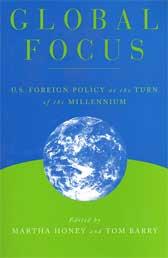Foreign Policy in Focus
Foreign Policy in Focus (FPIF) is a “think tank without walls” connecting the research and action of more than 600 scholars, advocates, and activists seeking to make the United States a more responsible global partner.
FPIF provides timely analysis of U.S. foreign policy and international affairs and recommends policy alternatives. We believe U.S. security and world stability are best advanced through a commitment to peace, justice, and environmental protection, as well as economic, political, and social rights. We advocate that diplomatic solutions, global cooperation, and grassroots participation guide foreign policy.
FPIF aims to amplify the voice of progressives and to build links with social movements in the U.S. and around the world. Through these connections, we advance and influence debate and discussion among academics, activists, policy-makers, and the general public.

